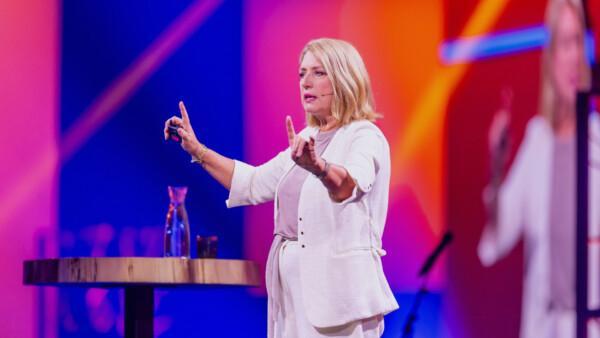25Sep2024
Making tough but necessary decisions. Pursuing a meaningful purpose. Trusting your team – even in difficult times. Courageous leadership is a hard but noble path, so we hope the following insights from Nordic Business Forum Day 1 will inspire you to embrace courage in your own leadership journey.
Adam Grant: Vulnerability is not weakness – it’s strength
When striving to realize potential in yourself and others, Adam Grant asked attendees to consider a core quality of courageous leadership: vulnerability. As Grant explained, “Vulnerability is confident humility, the ability to publicly acknowledge your own strengths as well as your weaknesses.”
The data shows that employees hesitate to provide feedback if they sense leaders aren’t open to criticism. Grant therefore urges proactive, public admission of personal weaknesses, as this lowers the barrier for sharing concerns. It also implies commitment to a growth mindset.
Ultimately, as Grant notes, your team is already aware of your weaknesses whether you acknowledge them or not. Instead of being ashamed of perceived weakness, open accountability creates a culture where others feel empowered to seek the help they need to develop, leading to a more supportive, transparent environment.
Liz Wiseman: Don’t be your team’s genius – play the role of genius maker
Are you a Gladstone, or a Disreli? A Diminisher, or a Multiplier? A Genius, or a Genius maker? According to Liz Wiseman, knowing the difference between these opposing leadership camps – and understanding which style you embody – is how you shift from being seen as the smartest person in the room to the person that makes everyone in the room feel smarter.
In reality, genius leaders are often diminishers that “acquire smart people and inevitably under-utilise them, because they tell people what to do, make fast decisions, and micromanage.” This leads to a tense, confused environment where employees shut down. On the other hand, multipliers develop the talents of the people they work with. They freely give ownership without ego and create a positive environment where people feel healthy pressure to deliver.
You might be a genius that happens to lead. But true leadership brings out the genius of your team.
Sanna Suvanto-Harsaae: Fun is an indicator of high performance
Fun might not seem an obvious indicator of a courageous leadership environment. However, as Sanna Suvanto-Harsaae revealed in her refreshingly direct keynote, high performance teams often have fun while getting things done. “Fun doesn’t mean having a laughing, screeching clown on your team. It means trust, because teams that laugh at themselves trust each other.”
When leadership encourages people to laugh at their vulnerabilities and failures, issues don’t get swept under the rug. A leadership style that embraces fun also leads to an average of 24% higher motivation across team members, and these teams are six times more likely to achieve their performance targets. Even in sales, a fun sales pitch has been shown to raise the price paid by customers by as much as 27%.
Morten Hansen: You need a strong Yes if you are to say No
The first of Morten Hansen’s five disciplines of courageous leadership is arguably the most challenging for growth-minded experimenters to embrace: the discipline of No. Simply put: “do less, then obsess.” In business, leaders often confront the unknown through risk-taking and experimentation, or by implementing risk mitigation and multiple backup plans. However, without clear focus, these approaches can lead to efforts that don’t directly push the company forward.
It’s easy to decline uninteresting tasks, but it takes real courage to say no to opportunities that resonate – especially when they come from leadership. Ultimately, effective strategy is about making choices about what not to pursue. Keeping this in mind will make it clearer which activities deserve a big Yes, and will also prove why a polite (but firm) No is sometimes the right call.
Steven Van Bellegham: Empathy in business should also be effective
During his work with one of the world’s most luxurious hotel resorts, Steven Van Bellegham witnessed a small but mighty ritual that drove the world class customer satisfaction scores of Dubai’s Atlantis, The Palm hospitality team.
Every morning, on duty staff would take 15 minutes to review every single question submitted by customers. They looked for multiple questions about the same topic where no answer currently existed. When these were identified, they quickly and simply created a process for addressing the problem.
As a result, they made a series of quick, small, proactive changes that let them deliver a constant stream of positive, unexpected yes answers to customers used to living in a world of no.
When the average person interacts with thousands of brands every week, the ability to “master fast feedback with fast action” through a process like this will help your company stand out from the crowd as a source of positive and fun surprises.
Will Guidara: People crave convicted leadership, and a sense of ownership
When Will Guidara talks about how his team’s commitment to unreasonable hospitality drove Eleven: Madison Park to become the best restaurant in the world, it’s worth taking note.
Guidara defined hospitality as “being creative and intentional in pursuit of making people feel seen.” The unreasonable component of his philosophy stemmed from his conviction to lead a team that strives for perfection in every moment, even the seemingly transactional ones.
By focusing on aspects of the customer experience that competitors hadn’t even thought about, Guidara’s team showed how deeply they cared about their customers. This attention to detail was only possible because every team member felt they owned some small piece of the customer journey. As a result, their creativity was sparked, they were inspired to deliver and innovate, and the whole experience was collectively elevated.



